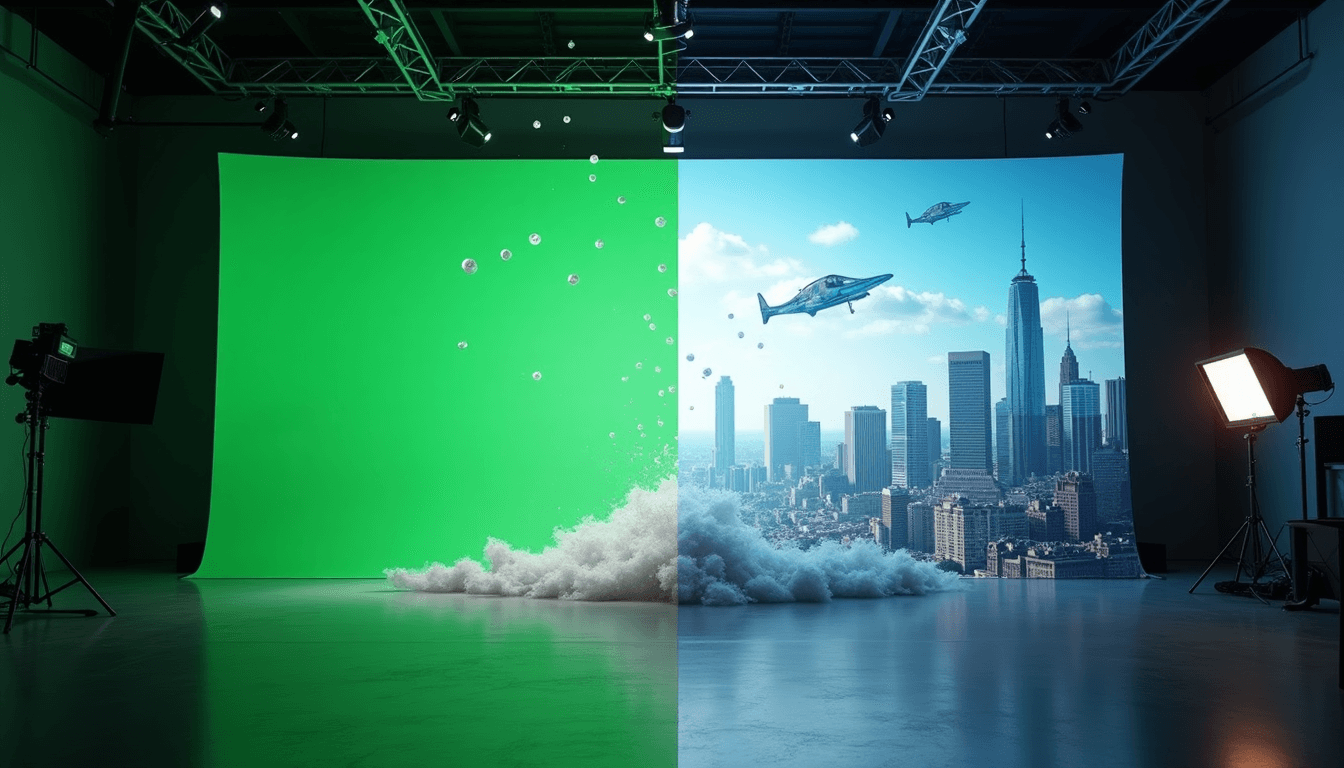The Art of VFX Breakdown Understanding the Basics
Discover the secrets behind the stunning visual effects that bring movies to life. Learn how to create VFX breakdowns that showcase the artistry and technical skill involved in crafting breathtaking cinematic experiences.


Visual effects appear in almost every scene of today's Hollywood blockbusters. Most people overlook the extensive VFX work behind their favorite movies.
The breathtaking VFX scenes from "Avengers" or "Avatar" captivate audiences worldwide. The movie's magic on-screen results from a complex combination of VFX effects that teams of artists carefully layer and craft. A VFX breakdown shows this incredible journey from raw footage to the final spectacle.
Years of experience studying and creating visual effects taught filmmakers that understanding VFX breakdowns is significant for professionals and enthusiasts. This piece will show you how to craft compelling VFX breakdowns, whether you're a filmmaker, VFX artist, or someone curious about movie magic.
Understanding VFX Breakdown Fundamentals ✨
Let's examine the fascinating world of VFX breakdowns and uncover the layers of magic that transform raw footage into cinematic masterpieces.
What is a VFX Breakdown ❓
A VFX breakdown provides a detailed analysis of the visual effects creation process in film or video projects. It demonstrates how artists blend each effect into the final product. Imagine peeling back an onion's layers — each layer reveals another aspect of the visual effects work, from raw footage to the final composited shot.
Types of VFX Breakdowns 🔍
There are common types of VFX breakdowns:
- Layer-based breakdowns: They show the progression of compositing work
- Before-and-after comparisons: They reveal the transformation from raw footage
- Technical demonstrations: They highlight specific VFX techniques
- Process reels: They document the complete workflow from start to finish
Purpose and Applications 🎯
VFX breakdowns are a great way to get industry insights. Studios use them extensively to submit awards and showcase their capabilities to potential clients. They work perfectly as marketing tools in behind-the-scenes content and promotional materials.
What is great about these breakdowns is how they demonstrate the complexity of visual effects work. VFX breakdowns highlight the mutually beneficial partnerships between different departments—modeling, animation, lighting, and compositing—helping viewers understand the teamwork needed to achieve those stunning shots.
Essential Elements of an Effective Breakdown 🛠️
VFX breakdown success comes from attention to detail. Three key elements make breakdowns work.
Layer Organization and Structure 📂
Proper layer organization forms the foundation of successful VFX breakdowns. VFX studios organize visual effects layers into distinct categories:
- Base Plates: Original footage and background elements
- Technical Passes: 3D renders, mattes, and depth maps
- Enhancement Layers: Color corrections, atmospheric effects
- Final Composites: Completed shots with all elements combined
Timing and Pacing ⏳
Timing makes all the difference in VFX breakdowns. Each layer reveal needs enough time for viewers to appreciate the transformation. Two to three seconds is enough per layer transition, with extra time for complex effects. This rhythm helps to follow the journey from raw footage to the final composite.
Music and Sound Design 🎵
Sound design can turn a good VFX breakdown into an exceptional showcase. VFX professionals build an atmosphere through multiple audio layers that deeply involve viewers. The right music should match the visual rhythm, and strategic sound effects highlight important transitions. Cathedral effects add depth to specific elements, while subtle ambient sounds create the perfect balance.
Complex sequences need extra care with audio transitions. The right volume levels combined with strategic fade-ins and fade-outs give VFX breakdowns a professional polish that impresses clients.
From Breakdown to Budget in Clicks
Save time, cut costs, and let Filmustage’s AI handle the heavy lifting — all in a single day.
Technical Components to Showcase 🎥
Let's explore everything in technical elements that should shine in the presentation.
3D Elements and Animations 🌀
VFX presentations show 3D work front and center. These key elements deserve the spotlight:
- Wireframe Models: The underlying geometry
- Texture Maps: Material development stages
- Rigging Systems: Character animation setup
- Particle Systems: Dynamic simulations
- Lighting Setups: Scene illumination
Compositing Layers 🖌️
Compositing workflow organizes layers systematically to present each shot's building blocks:
| Layer Type | Purpose | Common Elements |
|---|---|---|
| Base Plate | Original footage | Raw camera shots |
| Matte Passes | Isolation elements | Depth, motion vectors |
| CG Renders | 3D elements | Characters, environments |
| Atmospheric | Environmental effects | Fog, dust, precipitation |
Special Effects and Simulations 💥
Special effects and simulations create the most impressive moments in VFX breakdowns and presentations. These technical marvels need precise execution and careful attention to detail. VFX simulations showcase fluid dynamics, particle systems, and destruction sequences.
Complex sequences show how multiple simulation passes work together. You might see smoke interacting with wind forces, debris colliding with environments, or water dynamics responding to character movement. This careful presentation of technical components helps to understand the intricate process that creates believable visual effects.
Creating Impact Through Presentation ✨
Creating a compelling narrative that engages the audience is essential to present visual effects work. Powerful VFX breakdown and presentation tell a story that unfolds layer by layer, beyond technical demonstrations.
Transition Techniques 🔄
The right transitions can make or break a VFX breakdown presentation. VFX studios use various transition styles:
| Transition Type | Best Used For | Impact Level |
|---|---|---|
| Linear Wipes | Layer reveals | High |
| 3D Orbits | Environment showcases | Medium |
| Dissolves | Subtle transformations | Low |
| Dynamic Splits | Multiple element comparison | Very High |
Visual Flow and Rhythm 🎶
Visual rhythm plays a vital role in VFX breakdowns and presentations. A consistent pace helps viewers absorb complex information better. Here's a typical approach:
- Opening Impact: A 2-3 second reveal of the final shot starts things off
- Layer Progression: Each technical layer gets 1.5-2 seconds of screen time
- Transition Timing: Audio beats sync with our transitions
- Final Showcase: The complete effect displays for 3-4 seconds at the end
Highlighting Key Moments 📌
VFX studios showcase transformative elements that highlight visual effects' potential. For example, complex character animations get freeze-framed at peak moments so viewers can appreciate the intricate details.
The dynamic camera moves to draw attention to specific elements in our recent projects. Subtle zooms and pans guide the viewer's eye to important details they might miss otherwise. This approach works especially well with complex environmental effects or character transformations.
Strategic timing variations emphasize key moments effectively. It's possible to slow down particularly impressive effects sequences to 50% speed. This lets the audience fully appreciate the work's complexity.
Revolutionizing Visual Effects Planning: The Filmustage Advantage of VFX Script Breakdown 🚀
The evolution of visual effects has reached a pivotal moment where artistry meets artificial intelligence, transforming the approach and understanding of the magic behind modern cinema. While traditional VFX script breakdowns have long served as bridges between technical mastery and artistic vision, the emergence of automated solutions like cutting-edge AI tools is revolutionizing this landscape.
As productions grow more ambitious and effects-heavy, the ability to instantly generate comprehensive VFX script breakdowns while maintaining artistic nuance becomes not just convenient, but essential. This convergence of human creativity and technological precision ensures that every layer, transition, and effect serves both practical and narrative purposes.
Filmustage as an Assistant for VFX Teams 🤖
Filmustage emerges as a solution that transforms the traditional VFX breakdown process.
The platform's intelligent automation doesn't just save time - it fundamentally reimagines how VFX teams collaborate and plan their work. By instantly generating detailed breakdowns exportable to versatile spreadsheet formats, Filmustage creates a seamless bridge between creative vision and practical execution. This breakthrough particularly shines in complex productions where manual tracking could lead to costly oversights or miscommunications.
✨ Rather than tediously tagging individual elements, the platform's advanced AI can instantly identify and generate complete VFX sequences, capturing complex action descriptions in their entirety.

For VFX supervisors and producers grappling with tight deadlines and precise budgeting requirements, Filmustage's automatic VFX script breakdown feature serves as a crucial ally. The system's ability to capture, organize, and present effects-related data helps eliminate the common pitfalls of traditional planning methods. This technological leap forward ensures that every team member, from artists to coordinators, works from the same meticulously detailed scheme.
In an industry where innovation drives success, Filmustage has positioned itself as an indispensable tool for forward-thinking studios and VFX departments. Streamlining the entire pre-production process, allows creative teams to focus more on crafting spectacular visual effects rather than getting bogged down in administrative tasks. This efficiency boost particularly resonates with enterprise-level productions, where the scale and complexity of VFX work demand robust, reliable planning solutions.
From Breakdown to Budget in Clicks
Save time, cut costs, and let Filmustage’s AI handle the heavy lifting — all in a single day.